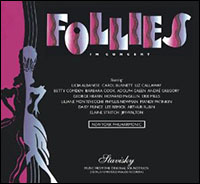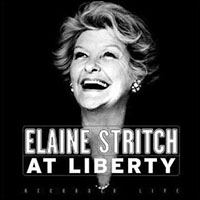
*
"The Ladies Who Lunch" from Company, 1970
Stephen Sondheim's Company, in a way, started the second stage of Stritch's long career. Joanne — the oldest and wryest of Bobby's good and crazy friends — was an ensemble role. You could call her the most important of the featured players, by virtue of her material, but she is truly one of 11. She does have the juiciest scene and the juiciest song. People have been singing "The Ladies Who Lunch" since it poured forth from Sondheim's piano bench in 1970, sure; but it really does belong to Elaine. Just listen.
Stritch went to London with Company in 1972 and stayed, mostly, for the rest of the decade. The visit was extended by the U.K. sitcom "Two's Company," the other one of the two being Donald Sinden. This began in 1975 and ran for four seasons; it is available on video from Acorn Media, and the two stars — as an American mystery writer living in London and her long-suffering butler — make things quite enjoyable. While we are dealing with Stritch's life on cast albums, let us asterisk the theme song "Two's Company" (music by Denis King, lyrics by Sammy Cahn). It is prime Stritch, at the very top of her game.
 |
||
| Cover art |
No, Stritch didn't appear in Stephen Sondheim and James Goldman's Follies; there was no role that fit. Hattie Walker, the character who sings "Broadway Baby," otherwise merely steps in and out of the proceedings. Not a profitable way of spending the evening for our Elaine. But when Follies was performed in concert at Avery Fisher Hall in 1985 for two performances with as close to an all-star cast as you're likely to find around Broadway, Stritch fit right in. Yes, Ethel Shutta, an authentic Ziegfeld star who originated the role in 1971 at the age of 74 — and who died in 1976 — was incomparable in the song. But Stritch does herself proud on the recorded Follies in Concert [Masterworks Broadway].
A Broadway baby, perhaps; but Stritch's personal vagaries (fueled by alcohol, as she has so readily discussed) kept her in limbo and away from Broadway — for over 20 years, from her final performance in Company until Hal Prince (producer/director of Company) gave her another chance in his 1994 revival of Show Boat. Stritch acquitted herself well, following up with a smashingly good dramatic performance in the 1996 Lincoln Center Theater revival of Edward Albee's A Delicate Balance.
 |
||
| Cover art |
And then it was that Stritch in 2001, having passed her 75th birthday, devised her one-woman show. Working with writer John Lahr and director George C. Wolfe, she managed to come up with what had evaded her since Truman was in office: a sturdy star vehicle tailored to her distinctive set of talents. Elaine Stritch At Liberty [DRG] was beyond superb, and Stritch herself was a marvel in it. What's more, it was a smashing big hit — for once, Elaine Stritch actually sold tickets — both at the Public Theater, where it started, and the Neil Simon, where it ended. Not ended, really; Stritch continued to use the material for the rest of her career, and I suspect she will continue to do so after her retreat to Michigan. Irving Berlin's show-biz anthem is not a prototypical Stritch song, of course. But this track — which served as the opening number for Elaine's shindig — perfectly illustrates the magic of Elaine Stritch At Liberty. She doesn't just sing the song; she mixes in anything and everything that comes to mind in impromptu fashion. Impromptu but with every pause and aside no doubt carefully contrived and modulated. "The costumes, the scenery, the makeup, the props"; eight words, it takes Stritch 75 full seconds to get through them. Literally. This is the essence of Stritch, finally unsheathed after all those years. Also of note is her gutsy rendition of Sondheim's "I'm Still Here." The track starts with 90 seconds of laughter and patter, but the performance is tops — although it is more Elaine Stritch than Carlotta Campion (i.e.: the character who sings it).
And so we have it. We've been watching Stritch through good times and bum times; I first saw her in 1967 as a perfect Ruth Sherwood in a City Center revival of Wonderful Town. Now she is gone forever; at least, for the time being. But that voice, and that sense of delivery, will long remain with us.
(Steven Suskin is author of "Show Tunes," "The Sound of Broadway Music: A Book of Orchestrators and Orchestrations," "Second Act Trouble," the "Broadway Yearbook" series and the "Opening Night on Broadway" books. He also pens Playbill.com's Book Shelf and DVD Shelf columns. He can be reached at [email protected].)
Visit PlaybillStore.com to view theatre-related recordings for sale.




Matthew-Murphy.jpg)
-Joan-Marcus-2022.jpg)



